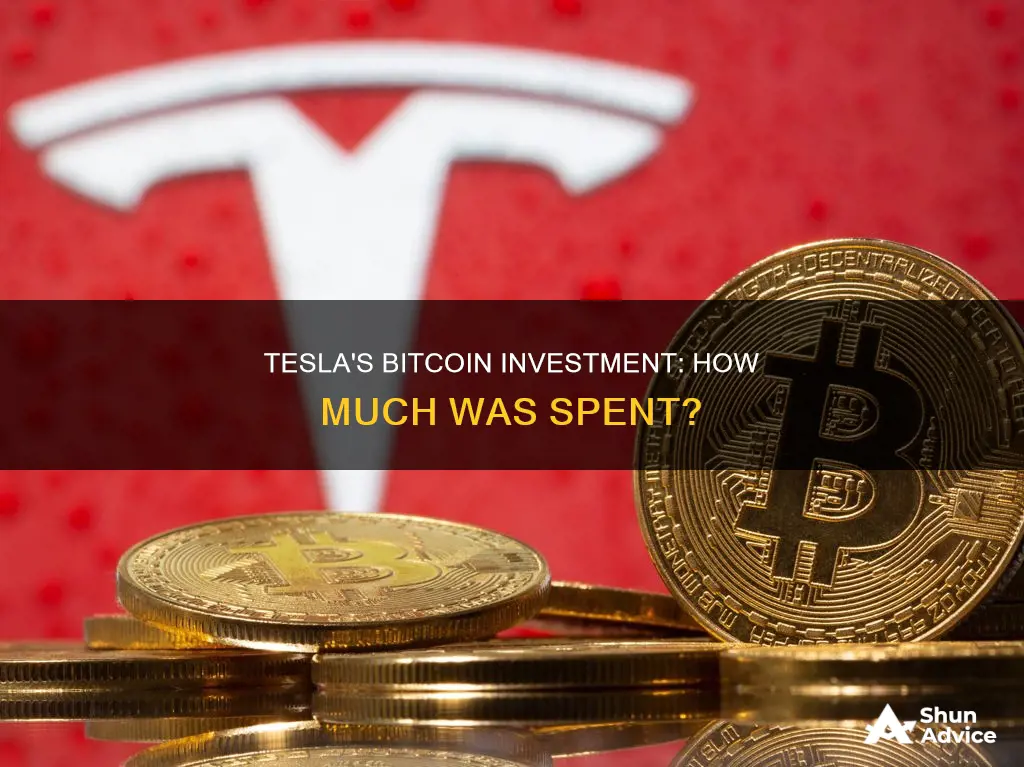
In February 2021, electric car company Tesla revealed that it had bought $1.5 billion in bitcoin and would soon start accepting the cryptocurrency as a payment method for its products. The news made Tesla the first major automaker to accept bitcoin and sent its price soaring to a record high of $44,200, a 300% increase on the previous year.
| Characteristics | Values |
|---|---|
| Amount Invested | $1.5 billion |
| Date of Investment | February 2021 |
| Number of Bitcoins | Approximately 43,000 |
| Percentage of Cash Invested | Significant percentage of over $19 billion in cash and cash equivalents |
| Investment Policy | To diversify and maximize returns on idle cash |
| Acceptance of Bitcoin | Planned to accept Bitcoin as payment for products |
| Impact on Bitcoin Price | Bitcoin price surged to over $44,000, a record high |
| Unrealized Gains | Over $600 million |
What You'll Learn

Tesla's $1.5 billion bitcoin investment
Tesla's $1.5 billion investment in Bitcoin in 2021 was a significant endorsement of the cryptocurrency and a reflection of CEO Elon Musk's support for digital currencies. This move represented a substantial percentage of Tesla's cash holdings, with the company having over $19 billion in cash and cash equivalents at the end of 2020.
Tesla's investment in Bitcoin was disclosed in a filing with the US Securities and Exchange Commission (SEC). The company stated that it sought to gain "more flexibility to further diversify and maximize returns on our cash" through this investment. Additionally, Tesla announced its intention to start accepting Bitcoin as a payment method for its products, making it the first major automaker to do so.
The impact of Tesla's investment on the price of Bitcoin was immediate and significant. The price of Bitcoin surged to new highs, reaching at least $44,200, and Tesla's shares also experienced a boost, increasing by more than 2% on the day of the announcement.
Elon Musk's influence on the popularity and price of cryptocurrencies, including Bitcoin and Dogecoin, through his social media activity, particularly on Twitter, has been well-documented. Musk's positive messages and endorsements have encouraged more people to buy digital currencies, leading to increased prices.
Analysts and experts offered varying perspectives on Tesla's Bitcoin investment. Some, like Dan Ives of Wedbush, viewed it as a positive move for the stock, while others, like the governor of the Bank of England, Andrew Bailey, maintained a cautious stance, reiterating the risks associated with investing in Bitcoin due to its volatile nature and lack of intrinsic value.
Tesla's embrace of Bitcoin highlighted the growing acceptance of cryptocurrencies by mainstream corporations and the potential for other companies to follow suit.
A Beginner's Guide: Investing in Bitcoin via Cash App
You may want to see also

Bitcoin's price surge
On February 8, 2021, Tesla revealed that it had bought $1.5 billion in bitcoin, with plans to start accepting the cryptocurrency as payment for its products. This move by the electric car company, run by the world’s richest person, Elon Musk, pushed bitcoin prices to a record high of $44,200, a 300% increase from the previous year. This surge in price was influenced by Musk's support for cryptocurrencies on Twitter, where he changed his profile to include "#bitcoin" and tweeted that he was a "supporter" of bitcoin.
The price of bitcoin is highly volatile and susceptible to market sentiment. Musk's endorsement of bitcoin and dogecoin on social media encouraged more people to buy these digital currencies, leading to a significant price increase. This phenomenon highlights the impact of influential figures on the cryptocurrency market and the potential for manipulation.
Following Tesla's announcement, bitcoin prices surged by more than 10%, according to CoinDesk. This price surge resulted in unrealized gains for Tesla, with its bitcoins potentially worth up to $2.2 billion, yielding a profit of over $600 million. This windfall for Tesla demonstrates the potential for substantial profits in the highly volatile cryptocurrency market.
The investment in bitcoin by a mainstream corporation like Tesla was a significant endorsement for the currency. It signaled to other companies that bitcoin is a legitimate reserve asset for their balance sheets. This move by Tesla may encourage other major companies to follow suit and accept bitcoin as a form of payment. However, it's important to note that Tesla's investment in bitcoin represents only about 8% of its total cash and liquid assets, as per the SEC filing.
While Tesla's investment boosted bitcoin's price, the cryptocurrency market remains highly speculative and volatile. Traditional investment experts have cautioned against investing in bitcoin due to its extreme price fluctuations without any apparent fundamental reasons. Additionally, critics have raised concerns about the environmental impact of bitcoin due to the significant computing power and energy required for crypto mining.
A Beginner's Guide to Investing Bitcoin on Binance
You may want to see also

Elon Musk's influence on cryptocurrency prices
Elon Musk, the CEO of Tesla, SpaceX, and The Boring Company, has become a central figure in the world of cryptocurrencies, with his actions and statements significantly influencing their prices and market trends. Musk's initial foray into the cryptocurrency market was in 2019 when he expressed interest in Bitcoin during a podcast, calling it "quite brilliant". However, it was not until 2020 that his influence on the crypto market became more pronounced.
One of the most significant events that showcased Musk's impact on the cryptocurrency world was Tesla's announcement in February 2021 of its investment of $1.5 billion in Bitcoin. This move signalled Musk's endorsement of the leading cryptocurrency and brought it into the mainstream. It also sparked debates about the role of corporate entities in the cryptocurrency space, with critics questioning the wisdom of a publicly traded company investing in a volatile asset. Following Tesla's announcement, the price of Bitcoin surged to new highs, reaching over $60,000 and even breaching the $44,000 mark for the first time.
Musk's influence is also evident in his prolific use of Twitter, where he has amassed a substantial fanbase in the crypto market. His tweets, often playful or cryptic, have triggered significant price fluctuations and market sentiment shifts. For instance, his positive tweets about Dogecoin, a meme-based cryptocurrency, have led to dramatic price spikes and increased interest. On the other hand, his infamous "Bitcoin is bad for the environment" tweet in May 2021 led to a sharp drop in Bitcoin's price as he cited environmental concerns associated with Bitcoin mining. This incident highlighted the susceptibility of the cryptocurrency market to external influencers and brought attention to the environmental impact of blockchain technologies.
Musk's actions and statements have had a profound impact on the cryptocurrency world, extending beyond his role as a tech entrepreneur. His influence has been felt through Tesla's investment decisions, his tweets, and his engagement with various cryptocurrencies, including Bitcoin and Dogecoin. Musk's ability to shape overall market sentiment and trigger rapid price movements has underscored the cryptocurrency market's sensitivity to influential figures.
While Musk's involvement has brought cryptocurrencies into mainstream conversations and contributed to their growing acceptance, it has also raised concerns about market manipulation and volatility. His tweets have been a major driver of short-term volatility, creating an environment conducive to speculative trading. Regulators have taken notice, with increased scrutiny on the potential for influential figures to manipulate markets through social media.
In conclusion, Elon Musk's influence on cryptocurrency prices is undeniable, with the power to move markets and shape public perception. As the cryptocurrency landscape continues to evolve, the role of influential figures like Musk will likely remain a topic of debate and regulatory scrutiny.
Bitcoin Investment: Late Starter or Missed the Boat?
You may want to see also

Bitcoin's acceptance as payment for Tesla products
In February 2021, Tesla announced that it had purchased $1.5 billion worth of Bitcoin and would start accepting the cryptocurrency as payment for its products. This was the biggest investment in Bitcoin by a consumer-facing company at the time.
Following the announcement, the rate of Bitcoin skyrocketed to an all-time high, breaching the $44,000 mark for the first time. This was a huge step forward for the institutional adoption of Bitcoin, with Rahul Pagidipati, CEO of Indian crypto-exchange ZebPay, stating that "it's a sign to other companies that bitcoin is a solid reserve asset for any balance sheet".
However, Tesla's acceptance of Bitcoin as a payment method was short-lived. In May 2021, Tesla's CEO, Elon Musk, announced that the company would no longer accept Bitcoin as payment due to environmental concerns. Musk cited the rapidly increasing use of fossil fuels, especially coal, for Bitcoin mining and transactions, which contradicted Tesla's focus on sustainability.
Despite this setback, Musk hinted that Tesla would consider accepting other cryptocurrencies in the future, and in January 2022, the company began accepting Dogecoin as payment for some Tesla merchandise in the US. While Tesla has not resumed accepting Bitcoin as payment, it has not sold off its Bitcoin holdings and has stated its intention to use it for transactions once Bitcoin mining adopts more sustainable energy practices.
A Beginner's Guide: Investing in Bitcoin in Saudi Arabia
You may want to see also

Concerns over bitcoin's environmental impact
In February 2021, Tesla invested $1.5 billion in Bitcoin, making it the biggest investment by a mainstream corporation into the most popular cryptocurrency. The company also announced that it would start accepting Bitcoin as a payment option for its products, making it the first major automaker to do so.
Bitcoin mining uses an immense amount of energy. The process requires a lot of electricity, and as it's become harder to mint new units of the cryptocurrency, more computational power is needed. The preprogrammed scarcity, combined with the potential for financial gain, means more people are using more electricity to mine what's left. The Cambridge Bitcoin Electricity Consumption Index estimates that Bitcoin mining uses more power globally per year than some countries, including the Netherlands and Pakistan.
The environmental concern comes from the estimated carbon footprint generated by the power plants providing the energy for mining. A single Bitcoin transaction is estimated to burn 2,292.5 kilowatt-hours of electricity, enough to power a typical US household for over 78 days.
Many countries, including the US, burn fossil fuels to generate electricity, which adds to the carbon in the atmosphere and worsens climate change. The US is estimated to be home to around 35% of Bitcoin mining operations and generates 60% of its electricity through fossil fuels.
There is also the issue of physical electronic waste. Computers, graphics cards, and purpose-built ASIC rigs are used for mining and constantly need to be upgraded, producing up to 30,000 tons of electronic waste every year.
The power plants necessary for crypto mining can also impact the surrounding ecosystem. For example, the Greenidge Generation plant in Dresden, New York, draws millions of gallons of water for cooling, discharging water back into Lake Seneca at 30-50 degrees Fahrenheit above normal temperature, endangering the wildlife.
Bitcoin and other proof-of-work cryptocurrencies require large amounts of energy to perform the work associated with crypto mining. The energy intensity of crypto mining is a feature, not a bug. The transaction validation process is designed to use large amounts of energy, depending on the computational power of thousands of computers. This dependency maintains the security of cryptocurrency blockchains that use proof-of-work consensus.
However, not all cryptocurrencies use a system that depends on large amounts of energy to run. Ethereum, Solana, and many others use a system that requires very little energy, and their environmental impact is minimal.
Calculating the carbon footprint of cryptocurrency is complex. Although fossil fuels are the predominant energy source in most countries where cryptocurrency is mined, miners seek out the cheapest energy sources to remain profitable. The Bitcoin network is estimated to be responsible for about 73 million tons of carbon dioxide per year, equal to the amounts generated by Oman.
Best Apps to Invest in Dogecoin
You may want to see also
Frequently asked questions
Tesla invested $1.5 billion in Bitcoin.
Tesla's investment in Bitcoin was part of a new investment policy to provide the company with more flexibility to further diversify and maximize returns on its cash.
News of Tesla's investment in Bitcoin sent the digital currency soaring to a record high of over $44,000, a 300% increase from the previous year.
Tesla's investment in Bitcoin was seen as a huge step in favor of institutional adoption of the cryptocurrency. It signaled to other companies that Bitcoin is a solid reserve asset for any balance sheet.







